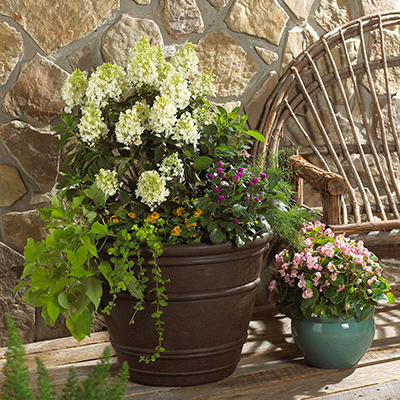
You should fertilize your plants regularly to ensure that you have herbs growing on your window sill. Natural fertilizers can also be made from fruit peels. To release vitamins, the peels can be soaked in water and rubbed on plants. Don't crowd your herbs. It will interfere with your kitchen's decor and will affect your plants growth. To avoid overcrowding, small rocks can be placed around your herbs.
Some herbs that thrive on windowsills include rosemary, oregano and chives as well as parsley, thyme and thyme. You can also plant seeds on your windowsill if you wish to grow more herbs. But most people prefer to grow their herbs in pots, rather than in soil. Here are some tips to help you grow your herbs. Make sure to water your herbs often!

Pots can be made from empty plates or cups of paper. Brightly colored pots can be chosen to match your kitchen decor. They look great on your windowsill. Make sure to add fresh manure to your potting soil. A pot that has the right amount nutrients will give you more freedom to grow. Overwatering your plants can lead to root rot. To allow water to drain from the container, a drain hole is recommended.
Indoors, you can grow your own herbs. Choose herbs that are most used in your kitchen. These herbs include parsley, basil, mint, chives. You can also create a window sill plant garden using seeds or a mature herb. Artificial light can be used to supplement your window sill garden if there is no windowsill. Small LED-style lights can be mounted in windows or under cabinets with ease. You can also find pots in a wide variety of colors and styles.
An easy way to grow windowsill herbs is to not make it difficult. It's a great project for kids and a simple DIY project for the whole family. With the proper amount of time, you'll have fresh herbs to use for cooking at any time of the day. You can even plant herbs in large enough containers to be used as garnishes in your dishes. These herbs are also easy to care for.

Before you start your herb garden, think about the types of herbs that you use most. Determine whether you want to grow herbs from seeds or buy smaller potted varieties. Decide whether to plant perennial or annual varieties. The perennials must be replanted every other year. Although perennials are more suitable for window sills, it is important to plant annual herbs every spring. To ensure healthy plants, make sure they get enough sun.
FAQ
How do you prepare soil for a vegetable gardening?
Preparing soil for a vegetable garden is easy. First, remove all weeds in the area where you plan to plant vegetables. You can then add organic matter, such as composted cow manure, leaves and grass clippings. Finally, water well and wait until plants sprout.
How much space does a vegetable garden require?
It is best to remember that 1/2 pound of seed will be required for every square foot. For example, if you have a 10 foot by 10 foot area (3 meters by three meters), 100 pounds of seeds will be required.
Do I need to buy special equipment to grow vegetables?
Not really. All you need are a trowel or shovel and a watering can.
How often do I need to water my indoor plants?
Indoor plants need to be watered every two days. Humidity levels can be maintained inside the house by watering. Healthy plants require humidity.
Statistics
- Most tomatoes and peppers will take 6-8 weeks to reach transplant size so plan according to your climate! - ufseeds.com
- According to the National Gardening Association, the average family with a garden spends $70 on their crops—but they grow an estimated $600 worth of veggies! - blog.nationwide.com
- It will likely be ready if a seedling has between 3 and 4 true leaves. (gilmour.com)
- 80% of residents spent a lifetime as large-scale farmers (or working on farms) using many chemicals believed to be cancerous today. (acountrygirlslife.com)
External Links
How To
How can I keep weeds away from my vegetable gardens?
Growing vegetables that are healthy is not possible due to weeds. They compete for space, water, nutrients, sun, and sunlight. These tips can help prevent them taking over your garden.
-
Take out all flowering plants
-
Take out any plant debris from the base of your plant
-
Mulch is a good choice
-
Get water regularly
-
Rotate crops
-
Do not allow the grass to grow.
-
Keep soil moist
-
Plant early
-
Harvest often
-
Make compost
-
Avoid chemical pesticides
-
Plant organic vegetables
-
Heirloom seeds available
-
Start small
-
Learn about companion planting
-
Be patient
-
Enjoy gardening!